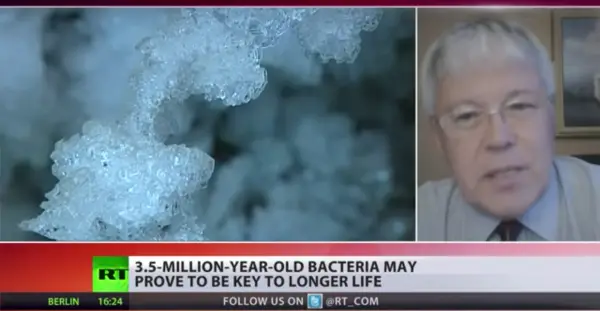Russian Scientist Injects Himself With 3.5 Million Year Old Bacteria, Claims He Had No Flu For Two Years
Tags: News

A Russian man believes that he has found the answer to eternal life after injecting himself with a 3.5 million year old bacteria.
The scientist, Anatoli Brouchkov, is head of the Geocryology Department at Moscow State University, and claims that since injecting himself with the ‘eternal life’ bacteria, he has not had flu for two years, and even claims that he has become stronger.
The specific bacteria is called Bacillus F and has remained alive for millions of years due to being in permafrost.
Whilst the bacteria had previously been tested on mice and human blood cells, Brouchkov put himself forwards to be a guinea pig in the experiment.
He told The Siberian Times, “After successful experiments on mice and fruit flies, I thought it would be interesting to try the inactivated bacterial culture. The bacteria is actually in trace amounts in the water of the region.
“The permafrost is thawing, and I guess these bacteria get into the environment, into the water, so the local population, the Yakut people, in fact, for a long time are getting these cells with water, and even seem to live longer than some other nations. So there was no danger for me.”
However, he admitted that he had no idea what the bacteria was actually doing to his body, as scientists are not yet sure exactly how it works as they claimed “we cannot understand the mechanism, but we see the impact.”
In an interview, he expressed his thoughts on the importance of exploring the effects of this bacteria, explaining that “if we can find how the bacteria stays alive we probably would be able to find a tool to extend our own lives.”
Through experimentation results, scientists also believe that it may help fertility, as it allowed female mice who would otherwise be too old to reproduce, to have babies.
Yakutsk epidemiologist Dr Viktor Chernyavsky, who thinks that the bacteria is a “scientific sensation” said that, “the bacteria gives out biologically active substances throughout its life, which activates the immune status of experimental animals”, which meant that older mice were more active and produced offspring.
Brouchkov discovered the bacteria in 2009, after finding it embedded in ancient permafrost located at Mammoth Mountain in the Sakha Republic, which is the largest region in Siberia.
The Siberian Times also reported that another bacteria that has been found in the permafrost has the ability to “destroy petroleum molecules, turning them into water, with the potential one day to create a new system for cleaning up oil spills.”
With an aim of discovering the workings and creation of bacteria that can protect itself, similar to the 3.5 million year old newly discovered bacteria, Brouchkov believes that it is crucial to spend a lot of time and research to understand these immortal cells.
He said, “the key question is what provides the vitality of this bacteria, but it is as complicated as which human genes are responsible for cancer and how to cure it. The scale and complicity of the question are nearly the same.
“I would say, there exist (in the world) immortal bacteria, immortal beings. They cannot die, to be more precise, they can protect themselves. Our cells are unable to protect themselves from damage. These bacteria cells are able to protect themselves.”
IMAGE CREDIT: RT
About The Author
Jess Murray is a wildlife filmmaker and conservation blogger, having recently returned from studying wildlife and conservation in South Africa, she is now striving to spread awareness about the truth behind faux conservation facilities throughout the world. You can follow Jess on Facebook Here

Would you like to create dream like states of relaxation on demand by tuning into the natural laws of nature? Join me and 500 other like minded individuals for a free online sound healing training which you can access instantly here…..
Leave Comment: